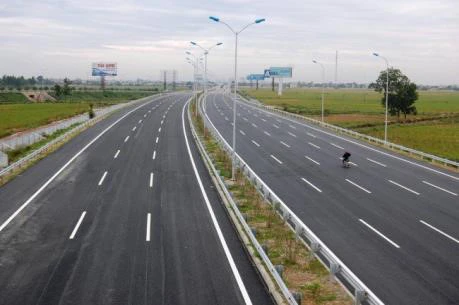 An elevated section of HCM City’s Ben Thanh – Suoi Tien metro line runs along Hanoi Highway. (Source: VNA)
An elevated section of HCM City’s Ben Thanh – Suoi Tien metro line runs along Hanoi Highway. (Source: VNA) HCM City (VNS/VNA) - HCM City will prioritise investment in road infrastructure if it receives permission to raise the budget revenue-retention ratio, according to the municipal Party Committee Secretary Nguyen Thien Nhan.
Speaking at a recent meeting in the city, Nhan said that "it would take 150 years to have enough roads for the city’s traffic activities" unless the city speeds up progress of road projects and invests more in transport and roads.
Traffic is the most pressing problem as there is an increase of one million motorcycles every five years in HCM City, leading to worsening congestion unless the busy roads are expanded and more roads are built.
"The rate of land allocated for transport remains too low," he said, adding that a city’s average road length around the world is at least 10km per sq.km, while HCM City will have only 2.1km per sq.km by the end of 2020.
"Another problem is a lack of housing," he said. "The average housing area of the city is 20 sq.m per person, while the national average is 24 sq.m.
In addition, the city also faces other problems such as flooding, sea-level rise, and ground subsidence, according to Nhan.
Singapore plans to spend 100 billion USD over the next 50 years to build dykes and drainage systems to prevent flooding.
HCM City does not have that much money but it will still need to earmark a certain amount of budget to tackle flooding which is threatening the lives of millions of people, he noted.
HCM City recently asked for permission to raise the budget revenue retention ratio to 24 percent in the 2021-2025 period, and 33 percent in the 2026-2030 period, the ratio granted to the city back in 2003.
The new ratio is considered to be sufficient for the city to ensure its stable development and affirm its role as the nation’s economic locomotive, which then in turn, would enable the city to contribute more to the national budget.
With only 9 percent of Vietnam’s total population, HCM City contributes 24 percent of the country’s GDP and 27 percent of the national budget, meaning each resident in the city is contributing three times as much as those in other localities, according to Nhan.
However, the city only gets to keep 18 percent of its annual budget collection, which hampers infrastructure investment and development, he said.
HCM City currently has the lowest budget retention rate of all cities in the world, and this should change.
For the 2016-2020 period, the city has been allowed to keep just 18 percent of its annual revenues, with the rest having to submit to the national budget.
HCM City has a population of 13 million people including migrants.
The city is among the 20 percent of localities in Vietnam which can cover its own expenditures while contributing to the national coffer.
For many years, the city has been the country’s largest money-maker and assigned the highest state budget collection target.
Last year, HCM City's budget collection topped 378 trillion VND (16.3 billion USD), up 8.6 percent compared to 2017.
In 2019, the southern metropolis is expected to make 412 trillion VND, or 27 percent of the national figure.
The latest estimation is 3.3 percent higher than the target./.
VNA





















